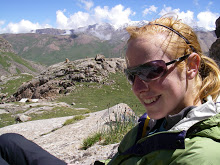Hi to all the faithful followers of foreign cultural experiences. I hope in reading this you successfully put off whatever it is you should be working on, whether that be a paper, this week’s bulletin, or a financial report.
Work continues with ups and downs. It would be too long to go into those right now, so let’s skip to the good stuff.
My high for the week has to do with cultural adaptation. There are a couple of signs that I’m fitting in well. I went to my first choir rehearsal and have been encouraged to keep coming to play volleyball even though I am far from the best player. I keep trying to explain that my game is Frisbee, but it might be better to wait until spring to demonstrate!
And I’m fitting in well with my host family. This is a family in transition, much as my family back home is. Two daughters are studying away from home, leaving a high-achieving brother close to graduating high school and parents settling into new roles. My host mother comes from a family of 11 children, many of whom are still living in this same village. Their great-grandmother matriarch and my host father’s parents are frequent quests. So what with husbands, wives, and children running around, things can get pretty busy here, especially on Saturday nights when everyone comes over to use the banya.
Disclaimer: this next passage contains blood and guts. Not for the faint of heart.
Last Sunday was a particularly large gathering: if Ait Kuni is the Kazakh equivalent to Trick-or-Treating, Sorghum is Thanksgiving. Sorghum is a day of preparation for many cold months. It is also a Muslim holiday to celebrate the year’s successes, measured by what animal you are able to slaughter, from the poorest chicken to the common sheep. We, being well-off, slaughtered the very best: a horse. And I got to help. It was one of those things that made perfect sense at the time until one of the sisters turns to me and asks, “So, what really are the differences between America and Kazakhstan?” And I could have said, “Well, in America, I would not be sitting here, blood under my fingernails, hacking with a dull knife at still-warm horse flesh.” But instead I said something about Americans valuing the individual over the communal. To which everyone shook their heads in disapproval, talking about how wonderful it is to have a good collective around you. This is a very real sentiment here; I was recently featured in the local paper (yup… complete with obligatory photo of teacher bending over student’s shoulder in an instructive manner) and it was interesting to note what struck the reporter as worth mentioning. There was nothing about the goals of Peace Corps or the work that I do. Instead, readers learned what my parents do, that my sister is studying to be an ecologist, and that my brother is in the 12th grade. Family is important here, as is the fact that I probably won’t get to go home to see everyone for two years.
But about the horse. I used to wonder if I could eat something that I had seen killed. It has always struck me as strange that I’ve made it this far in life without watching what I eat die. I’ve never been hunting and I’ve never lived on a farm, so I guess that accounts for it. But I have lived in Kazakhstan, so we can now answer one of life’s persistent questions. And in the affirmative: yes, I will eat what I have seen die.
I have never seen so much meat in my life. The women sat in the kitchen while the men, fortified from the cold with some vodka, did the most strenuous work and cleaning. In good time, they sent us huge slabs of meat through the back door and we got to work dicing for a special day-of dish of boiled meat and potatoes. As soon as that cauldron was filled, we started on the next, this time to make horse sausage (mixed with onion and garlic and stuffed conveniently in cleaned intestines). Many times over we filled bowls as big around as my encircled arms. I lost track of how many times we stopped to sharpen knives made dull by wooden cutting boards. My favorite part was the liver – bigger than a dinner plate and about the texture of guava paste. Now that I think about it, I probably just appreciated that it was easier to cut than the other stuff, which was difficult to work with on the account of fat and membranes. Which, incidentally, we did not discard. Everything went in – from cartilage to weird bits of bubble fat. Yum.
And while I can’t yet speak for the sausage, the meat is pretty tasty and might just be worth the effort.
Stay warm,
Nora
Tuesday, December 05, 2006
Subscribe to:
Post Comments (Atom)

2 comments:
Hello Dear Nora, I'm sitting struggling with statistics, having a cup of ginger lemon tea (Clemence has started the ginger trend in the apartment, it's supposed to be good for circulation but no improvements yet), and listening to Nickelcreek. Soon I'll make the trek to taekwondo, and then come back to struggle more with stats. Tomorrow I go to my first physical therapy session for my back. And I have no blood under my fingernails...and my chicken came in plastic. What an amazing picture of Kazak life...much love, Evie
My goodness, Nora, how your life is so different than back here in Vermont!
Glad to hear you are fitting in so well with your host family - even if the livestock will start fearing you now!
I can envision the picture of you leaning over a student and it makes me smile.
We miss you terribly here and send wishes for a very, happy holidays!
Post a Comment